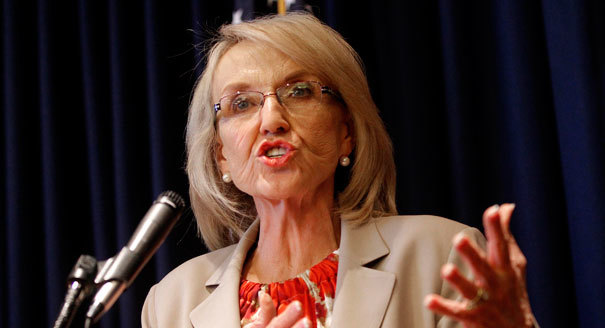Arizona Gov. Jan Brewer, who challenged President Obama’s health care law all the way to the Supreme Court, advocated publicly for full repeal of the law, and refused to set up a state-based health insurance exchange, changed her tune when it came to the law’s Medicaid expansion.
In a June showdown which included veto threats and calling a special session to force additional votes, the Republican Brewer’s coalition of Democrats and a few Republicans passed legislation that would expand the state’s Medicaid program. Arizona’s Senate voted in favor of the legislation 18 to 11 following an approval by the State House of Representatives.
Brewer said the expansion would secure $1.6 billion from the federal government that could cover the costs of the uninsured who show up at emergency rooms across the state and will allow Arizona to provide health insurance for an additional 240,000 residents and continue insuring 50,000 childless adults.
Brewer’s “Dirty Politics”
Christina Sandefur, staff attorney at the Goldwater Institute, says she was very disappointed by the Medicaid expansion and by the way it was passed.
“In order to get the legislation passed, Gov. Brewer had to resort to dirty politics. She threatened to veto any bill that came across her desk if she didn’t get the $8 billion for her budget, and actually did veto four bills before the legislature delivered her budget.” Sandefur said.
“Later, she called a special session to vote on the Medicaid expansion, and no one was allowed to leave until it was passed,” said Sandefur. “There was an extreme lack of transparency and an abdication of legislative responsibility by the members of the legislature in order to get this passed. It reminds me of the way ObamaCare was passed,” she added.
Increased Taxpayer Burden
Arizona now becomes the 24th state to expand Medicaid under Obama’s law. Tom Jenney, director of Americans for Prosperity-Arizona, says the expansion is not good for the state’s taxpayers, who will be on the hook for a program that will push more needy Arizonans into a costly, failing system that’s already bursting at the seams.
“We really don’t know how much this is going to cost Arizona’s taxpayers, because we don’t know how many people will sign up,” said Jenney. He notes the last Medicaid expansion in his state in 2000, known as Prop 204, resulted in about 500,000 people enrolling, despite estimates there would only be 273,000 new enrollees.
Jenney notes that “the supposedly ‘free’ federal money to pay for the expansion isn’t free at all—it’s money paid for by federal taxpayers, including our children and grandchildren, who must one day pay for our soaring national debt.
“If they are off by the same magnitude this time as they were the last time—when the committee projected that covering the Prop. 204 population would cost only $389 million in 2008, but the actual cost was $1.623 billion, or four times as expensive as projected—and there is no reason to believe they are not, then the state would need an extra billion dollars a year to cover the health care costs of all these new users,” Jenney added.
When the costs of the program inevitably explode, Jenney says, Congress will very likely dump the burden back onto states like Arizona by reducing the level of federal funding, leaving the state’s taxpayers holding the bag.
Future Challenges
Former Arizona state Sen. Frank Antenori, who formed a committee called “The United Republican Alliance of Principled Conservatives,” or URAPC, to block Obama’s law and its associated tax on hospital stays, sees a lot of pitfalls in the Medicaid expansion.
“Gov. Brewer and her supporters think it’s free money from the feds, but when it runs out, and it will, then the state taxpayers will have to start paying for it. This is going to be extremely expensive because when Arizona passed Medicaid expansion in 2000, they got almost double the number of enrollees that they anticipated. We can expect the same sorts of problems this time as well,” said Antenori.
Sandefur says the fight is not over, and she and her allies are looking into legal and ballot measure challenges to the expansion.
“No matter how Gov. Brewer tries to spin the expansion, it is still a tax, leaving it vulnerable to legal challenge. The voters will have a say in this, as will the courts,” said Sandefur.





